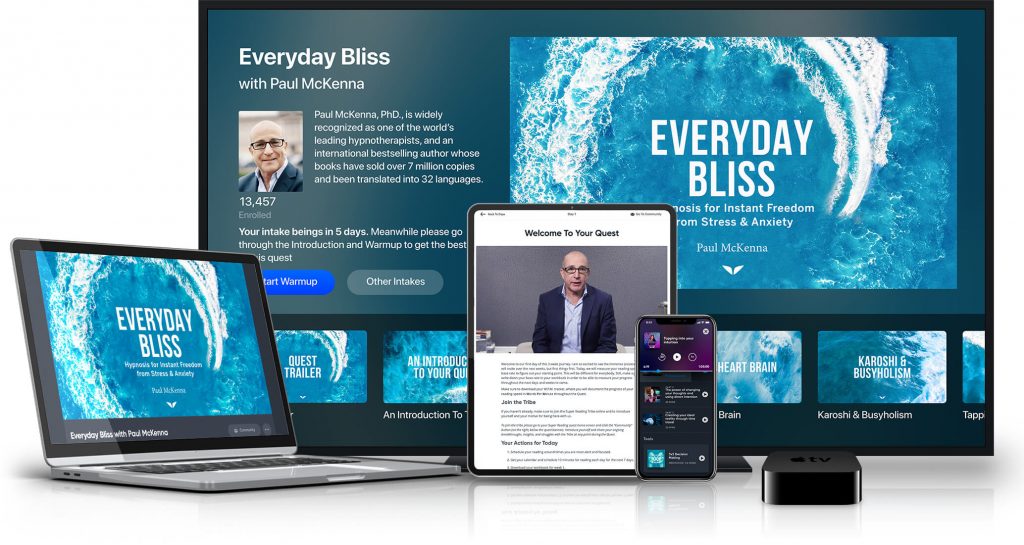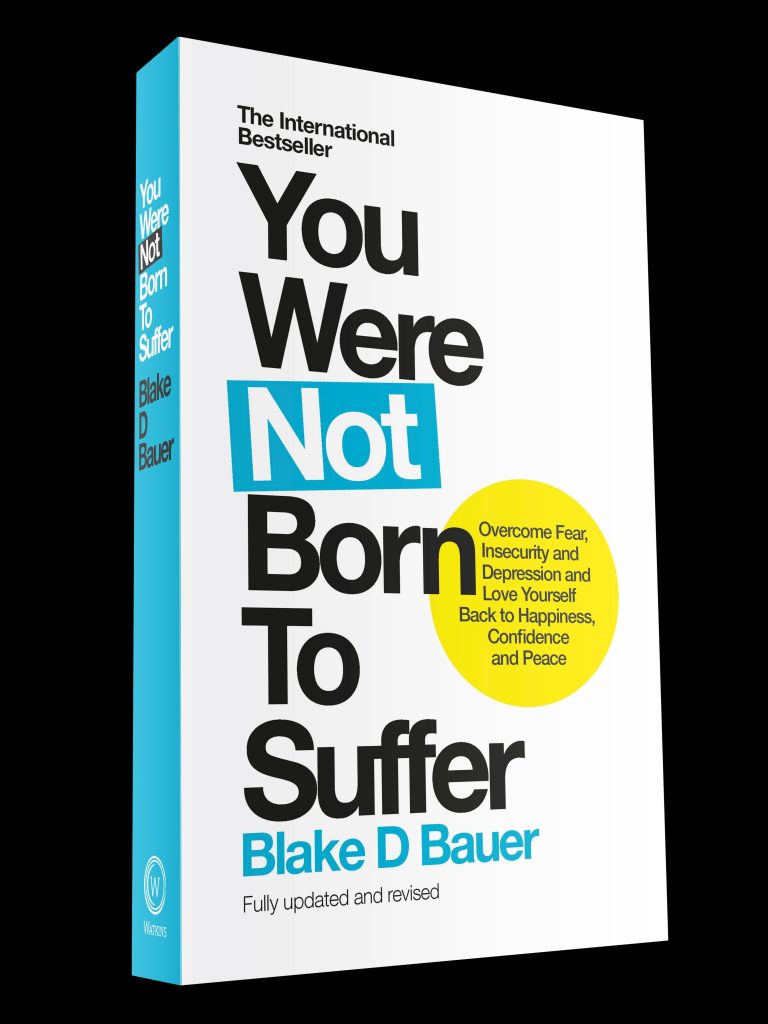We are all a bit crazy, in the sense that once we’re honest with ourselves we cannot deny the various voices in our head or the countless thoughts that circulate in our mind. I have come to perceive mental and emotional health in terms of practical functional sanity. In other words: can we take responsibility for our lives in a way that we do not harm ourselves, other people or the Earth while we do our best each day to be well, happy and kind?
In my experience, which I am sure is similar to your own, there is no such thing as ‘normal’. Although it is so common to think ‘he or she is normal but I am not’ or ‘their family is normal’ or ‘why can’t I just be normal?’ deep down we all know real life is stranger than fiction. Maybe the reason we can never get to ‘normal’ is because it does not exist. It’s like trying to find a city on a map you’re holding, only this city never existed and the person who drew the map did not know what they were talking about.
Being normal is mainly about being socially accepted, or, in other words, avoiding the judgement of other people. Of course, no one wants to be criticized, but at some stage, we have to make a choice between rejecting ourselves in exchange for the approval of others and taking the risk of being honest about our thoughts and feelings, regardless of the consequences.

Eventually you will realize that the pain of rejecting yourself is far greater than the pain of being rejected or judged by other people. So if being normal or socially accepted means you do not speak and act based on what you genuinely think and feel, you will always remain unhappy. This means we’re faced with the following questions. Do you want to be happy or socially accepted? Do you want to find peace and fulfillment or would you rather just fit in? Do you want to enjoy your life, work, physical body and relationships, or would you prefer to be controlled by the opinions, judgements and criticism of others?
One lesson that helped me tremendously in my quest for happiness, and also strengthened my ability simply to be myself over and above seeking love, approval and acceptance from other people, was understanding the fact that I am not just my thoughts or the voices in my head. Through meditation, self-reflection and healing internalized emotions from the past, I came to know and feel that who I am is far greater than my thinking mind and the conversations I regularly have with myself.
Furthermore, I found that most of my confused or contradictory thinking was simply the result of repressed emotions bubbling up as thought. Thinking then became an addiction as well as a means to escape feeling.

When I first realized that I was not happy, I was completely identified with all my thoughts, which were most often connected to feelings of fear, anxiety and insecurity. I believed the dialogue in my mind was ‘me’ or who I was, because I never learned that who I truly am is more accurately the awareness, consciousness, intelligence and energy behind my thoughts, which surrounds all my thoughts and purposefully gives rise to these thoughts for my own growth, healing and eventual enjoyment of life. Before I realized this, I had no space in my mind or my heart because my body had become cluttered with internalized emotions from the past as well as limiting beliefs I’d inherited from my parents, schooling and society.
I now know that without space there can be no happiness, so of course I was unhappy when I was completely attached to my thoughts. Like you, I had learned to give my power, happiness and sense of self over to my thoughts, thereby allowing myself to become the victim of the conversations in my head, which were most often completely out of control, stress-causing and very negative. Thankfully, there is a path to freedom. There is a form of functional sanity that is grounded in a healthy understanding and acceptance of your thoughts.

Most of us never learn how to relate to ourselves with acceptance, kindness and compassion. The majority of us don’t even know that it’s possible to love ourselves in healthy and conscious ways, let alone what doing so daily would actually entail. There’s a growing population of people who know they need to love themselves, but many are at a loss as to how to do so practically. In our early years, very few of us had people in our lives who embodied a healthy example of what it means to live and act in the world from a place of unconditional self-love.
Today most of us have become so accustomed to the negative voices in our head that we firmly identify with thoughts of criticism, judgement and inadequacy. We’re never taught how much freedom or peace is possible beyond this limited and unhealthy way of being.
For generations across the globe, self-love has been judged and shunned as negative and selfish, primarily because very few people actually understand what it means or why it’s so important to master. We can’t blame anyone for self-love’s negative reputation, because most people don’t know any better. If they did, they would, first, love themselves unconditionally, and second, always encourage others to do the same. The ultimate truth underneath our collective judgements and resistance to taking care of ourselves wholeheartedly is that we’re all merely protecting ourselves from feeling emotional pain.
More specifically, we all subconsciously fear what we do not love within ourselves, our lives and our past, because we fear feeling the hurt we ourselves have either created or allowed by relating to ourselves so self-destructively throughout our lives.
The unhealthy relationship the majority of us have with ourselves, in our own thoughts, emotions and behaviours, is really the one dynamic that keeps us at war inside ourselves, constantly feeling wounded, angry, powerless, anxious, guilty, ashamed, stressed, unwell or dissatisfied. Deep down we know we have not related to ourselves with the understanding, honesty and respect we desire and deserve, but the implications of shifting this seems overwhelming, so we just deny it or wear a mask each day.
If we do not eventually develop a relationship with ourselves that is based on understanding, acceptance and kindness, it’s not only impossible for us to feel good and enjoy our lives, it’s also impossible for us to relate to other people in these healthy ways. This is why it’s crucial for all of us to understand that our inner relationship with ourselves ultimately determines how we relate to everyone and everything in the world around us. In simple terms, if we judge, reject and criticize ourselves, we will treat others in the same hurtful ways. If our relationship with ourselves remains destructive, then our relationships with other people will remain destructive as well.
The liberating truth that unites all human beings is that we all struggle to love ourselves fully and unconditionally. It doesn’t matter how big our ego is, how arrogant we are, how much external success we’ve had, or how confident we appear. This is the ultimate life lesson that we all struggle with. You, me, the men and women around you right now, wherever you are – your family members, your friends, your neighbours, your colleagues, your boss, your employees, your children, and definitely your parents, and their parents too, all struggle, or have struggled, to relate to themselves with love, kindness and acceptance.
.jpg)
It’s just the way it’s been for generations. But now, we live in a time where more people are waking up and noticing their hunger for a new way of life. We’re all ready for new ways of relating to ourselves, to each other and to our world that are grounded in love, kindness and compassion as opposed to aggression. Many people are sick, unhappy, defeated and exhausted from living in such a cold and disconnected world.
Thankfully, learning to love ourselves unconditionally is not only possible, it’s also a necessary, natural progression in both the biological and genetic evolution of humanity, and the evolution of human consciousness. This means that life, nature and the entire universe are all working with us and guiding us towards nothing less than total mastery of life’s most overlooked and important lesson.
If we do not have love and respect for who we are today, because we both forgive and accept our past and now understand how to value ourselves in every situation, it is impossible for us to truly be at peace. It is not until we make the choice to relate to ourselves with kindness, honesty and respect every day that we finally find the lasting inner peace we crave.
So when it comes to our collective destiny as one human family to create peace on this planet, eventually it becomes clear that finding balance and harmony in our own lives is impossible when we relate to ourselves fearfully, aggressively and critically. If we do not live and act from a place of truth and compassion for ourselves, we will just continue to live and act in ways that are not only personally destructive, but that are also damaging for the entire world around us.
For this reason, it is crucial to grasp that world peace can only be created by individuals who value inner peace, compassionate understanding, mutual respect and loving-kindness above all else. If we aggressively try to change the world or other people, without honestly transforming our own anger, hurt, judgement or habits of denial, no amount of effort, force or war will bring about the lasting changes our world needs.
Excerpted from You Were Not Born to Suffer. Text copyright © Blake D Bauer. All rights reserved. Published by Watkins.
About the Author:

Blake D. Bauer is the author of the international bestselling book You Were Not Born To Suffer. Each year he helps thousands of people who cannot find effective support from conventional psychology, medicine, or religion. Blake is a world-renowned teacher and speaker with an extensive background in psychology, alternative medicine, nutrition, traditional healing, and mindfulness meditation. Based on both his personal experience overcoming deep suffering, addiction, and adversity, as well as his professional success with over 100,000 people worldwide, Blake’s pioneering work integrates what he’s found to be the most effective approaches to optimal mental, emotional, and physical health. For more information about the book, please visit https://www.unconditional-selflove.com and Facebook and follow the author on Facebook and Instagram.



